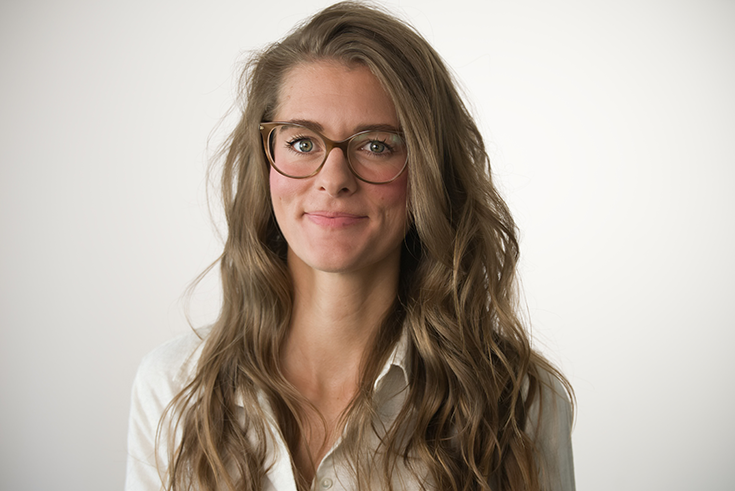Annie Montague explains how developing nature-based activities at the UBC Learning Exchange combined academics, career and community.
March 2, 2022
Name: Annie Montague
Current employer: Frontier College
Current job title: Regional Manager for BC
Learning Exchange role: Learning Lab Program Assistant (Work Learn) and Graduate Academic Assistant, 2019
Home town: Salt Lake City, Utah
Current location: Vancouver, BC
Faculty: Education
Program: Department of Educational Studies (MA)
Research topic: Sustainability Education & Equity
UBC degree conferred in: May 2019
- How did you hear about or get involved with the UBC Learning Exchange?
- What did you do at the Learning Exchange?
- How did your experience at the Learning Exchange influence your academic and/or career path?
- Do you feel you brought any new perspectives to the Learning Exchange? How might you have influenced the Learning Exchange?
I found the job through my department list-serve at UBC. The position stood out because I had already worked in the Downtown Eastside (DTES) at RayCam Co-operative Centre. I didn’t know anything about the Learning Exchange, but the job description was pretty broad, which intrigued me. When I had my interview, they asked about my interests and passions. It was clear from the start they wanted to collaborate.
I really wanted to maintain, keep learning from, and build on the relationships I started at RayCam. In community engagement work, it’s so easy for people to drop-in and drop-out when working with the community. I wanted to keep building connections here in the neighbourhood. At the same time, it was important to me to integrate what I was learning in school with actual community-based work. The Learning Exchange is a great place for this to happen.
I was a masters student in the Faculty of Education with a focus on environmental education, so I developed a series of place-based activities for community residents. The DTES has a lack of green-space relative to other areas in the city; many people view the neighbourhood as devoid of nature with limited opportunities to engage with their surroundings. However, there is so much happening in the DTES that intertwines social and environmental justice. So, I spent a lot of time connecting with people already doing impactful nature-based work in the neighbourhood who might want to collaborate, and developing new activities and experiences based on community members’ interests. Plus, the Learning Exchange Drop-In program was already planning awesome field trips—to Lynn Valley, the Beaty Biodiversity Museum, the International Bird Festival, Stanley Park, Trout Lake for National Indigenous People’s Day—that fit with the series I was planning.
In the end, we organized 15 sessions and field trips, so it’s hard to choose one highlight. For example, during the International Bird Festival, artist Jaymie Johynson taught us how to weave invasive plant species into bird nests, which were later showcased in an art installation on the Arbutus Greenway. Many times, Hives for Humanity invited us to workshops at the nearby Hastings Folk Garden. A favourite was when Indigenous herbalist Lori Snyder taught us about the plants growing in the neighbourhood and their medicinal uses. At another, we created plant terrariums. A community resident suggested it after seeing boutiques pop up in the neighbourhood selling small potted succulents for $20-80 each. He suggested we could make our own. For me, it connected so many threads—the idea came from a community member, it was focused on nurturing plant life, had the potential for duplication and income generation, pushed back against the gentrification in the neighbourhood, and could be made with up-cycled or low-cost supplies.
The work was perfectly timed in terms of my studies intersecting with practical, hands-on experience. It gave me a place to broaden my practice into adult education, which up to that point had been focused on children and youth.
I went from Learning Exchange worker to Learning Exchange partner! I’m now the Regional Manager for B.C. at a national literacy organization that works with partner organizations to support educational programming with children, teens and adults. We currently partner with over a dozen organizations in the DTES and Lower Mainland.
So much of my work is intertwined with the work I did at the Learning Exchange. It allowed me to continue building relationships and keep my career momentum going. Also, my relationship with Learning Exchange coordinators has been essential. They continue to loop me into important networks and I still follow their lead on how to orient volunteers to the DTES community using an asset-based approach, helping people understand the effect of individual and systemic privilege, and the importance of equitable relationships.
My personal and professional life revolves around better understanding and promoting the interconnectedness of where we live, and the implications that has for the health and well-being of our communities and planet. In a broad sense, I’d like to think that my time at the Learning Exchange helped introduce or deepen this understanding. I also would like to think that some of the partnerships that I built when I was there—like the connection with Hives for Humanity—are lasting and that I was able to reach out to work with different organizations that weren’t necessarily oriented toward what one might consider “essential services,” but encompassed community connection, well-being, and health nonetheless.
Want to explore more student learning opportunities at the UBC Learning Exchange? Learn more here.
Related stories

WATCH: ‘What is the Learning Exchange?’

Three honors for three team members in three months

COMMUNITY VOICE: UBC Tandem study meets the DTES CREW